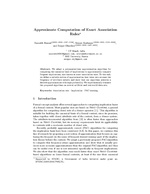Inproceedings3385: Unterschied zwischen den Versionen
Aus International Center for Computational Logic
Sergei Obiedkov (Diskussion | Beiträge) (Die Seite wurde neu angelegt: „{{Publikation Erster Autor |ErsterAutorVorname=Saurabh |ErsterAutorNachname=Bansal |FurtherAuthors=Sriram Kailasam; Sergei Obiedkov }} {{Inproceedings |Referiert=1 |Title=Approximate Computation of Exact Association Rules |To appear=0 |Year=2021 |Month=Juni |Booktitle=Formal Concept Analysis. ICFCA 2021 |Pages=107--122 |Publisher=Springer |Editor=Agnès Braud, Aleksey Buzmakov, Tom Hanika, Florence Le Ber |Series=Lecture Notes in Computer Science |Volume=…“) |
Sergei Obiedkov (Diskussion | Beiträge) Keine Bearbeitungszusammenfassung |
||
| (Eine dazwischenliegende Version desselben Benutzers wird nicht angezeigt) | |||
| Zeile 11: | Zeile 11: | ||
|Month=Juni | |Month=Juni | ||
|Booktitle=Formal Concept Analysis. ICFCA 2021 | |Booktitle=Formal Concept Analysis. ICFCA 2021 | ||
|Pages=107 | |Pages=107-122 | ||
|Publisher=Springer | |Publisher=Springer | ||
|Editor=Agnès Braud, Aleksey Buzmakov, Tom Hanika, Florence Le Ber | |Editor=Agnès Braud, Aleksey Buzmakov, Tom Hanika, Florence Le Ber | ||
| Zeile 19: | Zeile 19: | ||
{{Publikation Details | {{Publikation Details | ||
|Abstract=We adapt a polynomial-time approximation algorithm for computing the canonical basis of implications to approximately compute frequent implications, also known as exact association rules. To this end, we define a suitable notion of approximation that takes into account the frequency of attribute subsets and show that our algorithm achieves a desired approximation with high probability. We experimentally evaluate the proposed algorithm on several artificial and real-world data sets. | |Abstract=We adapt a polynomial-time approximation algorithm for computing the canonical basis of implications to approximately compute frequent implications, also known as exact association rules. To this end, we define a suitable notion of approximation that takes into account the frequency of attribute subsets and show that our algorithm achieves a desired approximation with high probability. We experimentally evaluate the proposed algorithm on several artificial and real-world data sets. | ||
|Download=Bansal2021approximate.pdf | |||
|DOI Name=10.1007/978-3-030-77867-5_7 | |DOI Name=10.1007/978-3-030-77867-5_7 | ||
|Forschungsgruppe=Wissensbasierte Systeme | |Forschungsgruppe=Wissensbasierte Systeme | ||
}} | }} | ||
Aktuelle Version vom 19. Juni 2024, 09:50 Uhr
Approximate Computation of Exact Association Rules
Saurabh BansalSaurabh Bansal, Sriram KailasamSriram Kailasam, Sergei ObiedkovSergei Obiedkov
Saurabh Bansal, Sriram Kailasam, Sergei Obiedkov
Approximate Computation of Exact Association Rules
In Agnès Braud, Aleksey Buzmakov, Tom Hanika, Florence Le Ber, eds., Formal Concept Analysis. ICFCA 2021, volume 12733 of Lecture Notes in Computer Science, 107-122, June 2021. Springer
Approximate Computation of Exact Association Rules
In Agnès Braud, Aleksey Buzmakov, Tom Hanika, Florence Le Ber, eds., Formal Concept Analysis. ICFCA 2021, volume 12733 of Lecture Notes in Computer Science, 107-122, June 2021. Springer
- KurzfassungAbstract
We adapt a polynomial-time approximation algorithm for computing the canonical basis of implications to approximately compute frequent implications, also known as exact association rules. To this end, we define a suitable notion of approximation that takes into account the frequency of attribute subsets and show that our algorithm achieves a desired approximation with high probability. We experimentally evaluate the proposed algorithm on several artificial and real-world data sets. - Forschungsgruppe:Research Group: Wissensbasierte SystemeKnowledge-Based Systems
@inproceedings{BKO2021,
author = {Saurabh Bansal and Sriram Kailasam and Sergei Obiedkov},
title = {Approximate Computation of Exact Association Rules},
editor = {Agn{\`{e}}s Braud and Aleksey Buzmakov and Tom Hanika and
Florence Le Ber},
booktitle = {Formal Concept Analysis. {ICFCA} 2021},
series = {Lecture Notes in Computer Science},
volume = {12733},
publisher = {Springer},
year = {2021},
month = {June},
pages = {107-122},
doi = {10.1007/978-3-030-77867-5_7}
}
